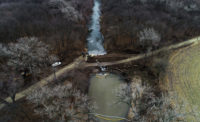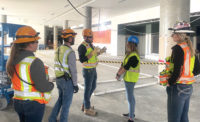Charles "Charlie" Button, who, as chief engineer and deputy chief operating officer of the Massachusetts Water Resources Authority (MWRA), managed significant infrastructure built as part of the court-ordered $3-billion cleanup of Boston Harbor in the 1990s, died on March 17 at age 70.
Button
He told ENR in 1997 that initial local uproar over the harbor cleanup's cost impact on sewer rates changed after the project delivered "a tangible result—a clean harbor—and seeing ... white wakes behind boats.''
The cause of death was cancer, said an online obituary.
Button, who also was chief engineer of the Boston Water and Sewer Commission, managed a major upgrade of the region's drinking-water system, serving more than 2 million. He later joined consultant Rizzo Associates Inc., Natick, Mass., as chief engineer.
But he was recruited back to MWRA in 2005 to oversee combined sewer overflow and drinking water upgrade projects.
Button also held leadership roles in local chapters of the American Public Works Association and the American Society of Civil Engineers.
In a tribute, Vivien Li, president of The Boston Harbor Association, of which Button was a trustee, said "Charlie's impact can be felt all over Boston, and especially on our waterfront and in the harbor." She said his ten-year tenture as commission chief engineer ending in 1988, came "at a time of increased environmental awareness, following the first Earth Day in 1970 and passage of the federal Water Pollution Control Act Amendments of 1972, and Charlie began to translate the public's environmental concerns into the [agency's] on-going work."
According to Li, Button's oversight of treatment plant and conveyance infrastructure construction for MWRA "resulted in our Harbor being one of the cleanest urban waterways in the country." The project was completed on-time and under budget. "That is what I call success!" said Rep. Joe Moakley in a tribute to Button in the U.S. Congressional Record in 1998.
In her tribute, Li says Button also was key to environmental approval of subsequent large infrastructure projects in Boston as a member of the city's Conservation Commission. "Charlie spent thousands of hours reviewing projects including the Central Artery/Tunnel Project, Boston Convention and Exhibition Center, MBTA Silver Line Waterfront route, Muddy River Restoration Project, and numerous others," she says. "He also mentored young professionals, and encouraged women to pursue careers in engineering."
Adds MWRA Executive Director Frederick Laskey: "Our city is so much better for all that he did."





Post a comment to this article
Report Abusive Comment